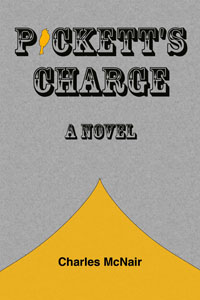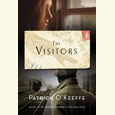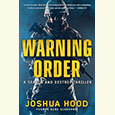Ain’t Hell Meat Yet
In Charles McNair’s Pickett’s Charge, a century of Southern history unfolds as the last Confederate soldier sets out on a fantastical quest
Nearly everything about Charles McNair’s novel Pickett’s Charge is a bit of a stretch. For starters, Threadgill Pickett may be 114 years old, but his physical condition is sturdy enough to withstand considerable hell and high water. Threadgill believes he is the last surviving Confederate soldier. In the summer of 1964, he lies languishing in a rest home in Mobile, Alabama, until a mysterious visitation by his long-dead twin brother Ben propels him toward a grand mission: Threadgill will travel to Bangor, Maine, and finish the war once and for all by killing the last Union soldier.
 Though Ben’s call to action sparks a “new light” in Threadgill’s eyes, McNair describes that light as “a cold sun.” Nothing about the outside world seems quite right. As Threadgill flees Mobile, he passes in and out of dream states, memories, and hallucinations from the past, calling into question his state of mind and even the plausibility of the world around him. Absurdity and tragedy follow him wherever he goes, and revenge begins to seem a far tougher, stranger business than he had anticipated. Everything he believes, including his burning mission of vengeance, begins to unravel.
Though Ben’s call to action sparks a “new light” in Threadgill’s eyes, McNair describes that light as “a cold sun.” Nothing about the outside world seems quite right. As Threadgill flees Mobile, he passes in and out of dream states, memories, and hallucinations from the past, calling into question his state of mind and even the plausibility of the world around him. Absurdity and tragedy follow him wherever he goes, and revenge begins to seem a far tougher, stranger business than he had anticipated. Everything he believes, including his burning mission of vengeance, begins to unravel.
Threadgill is a remnant from another era, both historically and emotionally. As the world of the twentieth century confounds him with its increasingly wild and fantastical obstacles, he falls deeper into the past, replaying the events—a century earlier—that led him into the deadly path of war. McNair alternates between the two centuries, creating a grand canvas for Threadgill’s adventure. Both narratives proceed in rich detail, defying cliché by offering constant surprise. As tragedy and hilarity become intertwined, the novel swings without warning between the epic and the personal. Wild encounters with characters that might have come straight from the Flannery O’Connor playbook appear alongside tender, heartbreaking incidents from Threadgill’s early boyhood.
McNair captures his protagonist’s disorientation through freewheeling descriptive power. Here, in one of many masterfully written passages detailing Threadgill’s battles with nature, the beautiful dangers of the South’s wilderness cast a confusing thrall, as Threadgill tries to cross a swift river:
Threadgill then felt something happen in his head.
 Before his very eyes, the river seemed to gain velocity. It turned red, like blood. Then the old man saw a herd of foam horses gallop past, thundering, a lightning storm of froth manes and tails, mad eyes flashing blood red too.
Before his very eyes, the river seemed to gain velocity. It turned red, like blood. Then the old man saw a herd of foam horses gallop past, thundering, a lightning storm of froth manes and tails, mad eyes flashing blood red too.
A brilliant morning sun boiled in red water.
A kingfisher, patrolling tree to tree, sank and rose in its flight above the old man’s head. Threadgill squinted painfully into the dazzling sky to follow it.
To McNair’s great credit, all the absurdity soon begins to seem logical. As Threadgill travels away from Mobile Bay, through the backwoods, highways, and cities of the civil-rights era, all manner of nonsensical things are bound to happen—the “cold sun” of Threadgill’s century-old grief distorts everything. But his vendetta is not motivated by nostalgia for the Old South. Killing the last Yankee soldier would be payback for his brother’s death, which happened not on a hallowed battlefield but in a useless act of cruelty: Ben was murdered, and Threadgill wants vengeance. His motive is not ideological. It’s personal.
McNair avoids the potential narrowness of Threadgill’s Confederate mindset in part through unexpected shifts in point of view which expand the book’s scope. Threadgill’s young mother offers a significant emotional foundation for Threadgill’s childhood. A trucker just passing through the main events of the book gets his own brief interlude, interpreting a rabid spider-monkey attack he witnessed as a sign that the devil is “calling for his soul.” His battle cry could also have come from Threadgill’s own heart: “Not yet! I ain’t Hell Meat yet!” The book’s most lyrical, ambitious chapters assume the perspective of a bird in flight:
Yellowhammer crosses the humped hard spine of Red Mountain. It shadows gravestone-white row houses. Tricycles rust in deep weeds, in caustic dew. Old ladies sit on porches and gasp asthmatically into handkerchiefs. Parts fall off cars. Slag spills off roadways, charred, white as ash. Sunbleached plastic flamingoes, one-legged, lie fallen on bitterbrown lawns.
Things fall apart.
Yellowhammer remembers the songs of men in blue and gray, the songs of blacks, stripped to the waist. Did all of them really fight and struggle and die to end up with a world so bleak?
Yellowhammer feels fresher over open countryside.
Pickett’s Charge is McNair’s first novel in nineteen years and the first to follow his Pulitzer-nominated Land O’ Goshen. It is tempting to draw a parallel between McNair’s lengthy struggle to bring Pickett’s Charge to light and Threadgill’s arduous, improbable journey. Regardless, the novel itself reads as though it has passed through a long battle. Like Threadgill himself, this book’s vulnerable, messy, ornery, passionate sense of mission is integral to its charm and its power to surprise and enchant. McNair casts a spell that’s simultaneously intimate and heroic.
Charles McNair will discuss Pickett’s Charge at Howlin’ Books in Nashville January 30, 2014, at 6 p.m.


